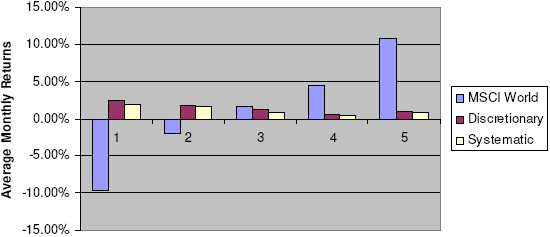Do Commodity Trading Advisors (CTAs), generally associated with the “managed futures” hedge fund style, successfully time their chosen markets? These traders take long or short positions in investment vehicles with low transaction cost (such as futures contracts) to exploit trends in commodity prices, exchanges rates, interest rates and equity prices. In the February 2008 version of their paper entitled “Market Timing of CTAs: An Examination of Systematic CTAs vs. Discretionary CTAs”, Hossein Kazemi and Ying Li investigate the return and volatility timing ability of CTAs and examine whether there is a difference in market timing abilities between systematic and discretionary traders. To this end, they develop a set of risk factors based on returns from the most heavily traded futures contracts. Using monthly, net-of-fees return data for 1994-2004 (encompassing 278 live and 622 defunct CTA funds), they conclude that:
- CTAs exhibit both return and volatility market timing ability in many declared market specialties, most notably for currencies, interest rates and
commodities. However, stock index CTAs display negative return timing. - Systematic traders are generally better market timers than discretionary traders.
- Systematic traders show timing ability for the best performing currency futures and physical product (corn, crude oil, natural gas and gold) futures.
- Discretionary show timing ability for physical product futures in aggregate.
- As a group, CTAs generate returns from market timing rather than security selection.
The following chart, taken from the paper, plots the average 36-month returns for discretionary and systematic futures traders according to the contemporaneous performance of MSCI World equity index ordered from worst (1) to best (5). Results show that managed futures tend to perform best when equities perform worst and that the performance of systematic traders is more negatively related to that of equities.

In summary, expert futures traders exhibit some market timing ability, and those who employ trading systems out-time those who do not. Market timing is more important to futures traders than securities selection.